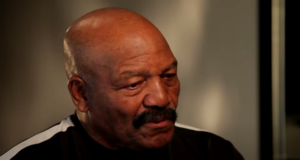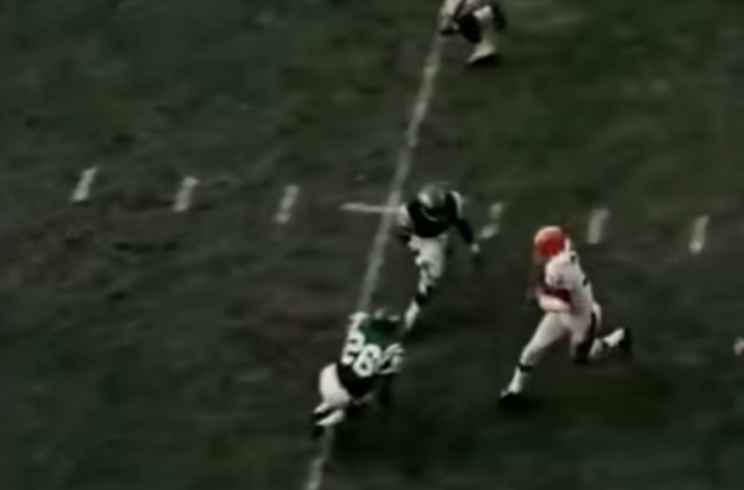
The National Football League and its fans bid a legend’s farewell to one of its most respected and feared warriors last week when Jim Brown passed away at the age of 84.

Jim Brown’s back, the second most common sight of defenders – via Duke Wilson 14 YouTube
A titan on the field, on the screen, and in life, Brown is considered by many experts to be the greatest single force of the NFL’s first 50 years. His dominance as a running back is widely documented.
The man who was way too fast to be a fullback led the league in rushing eight out of his nine seasons. Then, he retired on top, at the height of his game and value. Upon his exit, he had amassed 12,312 yards in just 118 games. That left him at 104.3 yards per game for his career along with 126 touchdowns.
It was a herculean performance that left many of his opponents bewildered. Many of them seemed relieved when Brown walked away from the game with so many miles on his odometer.

Jim Brown’s front, the most common and feared sight for defenders – via Duke Wilson 14 YouTube
RELATED: Former Raiders Wide Receiver Henry Ruggs Pleads Guilty To Driving Drunk 156 MPH In Fatal Crash
Upon the news that the bruising back had retired to become an actor, former New York Giant defensive back Carl ‘Spider’ Lockhart famously said: “The only way to stop Jim Brown was to give him a movie contract.”
He would then blaze a trail to Hollywood, becoming one of the motion picture industry’s first black action heroes. At the same time, he became more and more active in political and social issues. Brown implored African-Americans to take control of their communities through advanced education and financial focus. At a time when the world was changing rapidly, he became a symbol of cultural change.
Alongside other athletes of the day like Bill Russell and Muhammed Ali, Brown used his sporting platform to help push for improvements not only for – but also by – African-Americans to control their own destinies. However, unlike many black leaders of the day, he leaned heavily toward self-reliance. Part of that had to deal with not demonizing others.
RELATED: Former Las Vegas Raiders Tight End Foster Moreau Announces Cancer Diagnosis
“I was in this country where I got help from people that were not of my same color,” Brown once said. “So when I come out of the box, I don’t come out of the box as racial. I look for good people, and people that will be like-minded and help me try to do good for other human beings.”
Over the course of several decades, Jim Brown criticized several so-called leaders on every side of the political equation. And he did so with the same bravado that he played on the gridiron. Because of that, he would often find himself either at odds with – or aligned alongside – some of the nation’s most powerful figures. He was even allegedly spied on by the Federal Bureau of Investigation during the height of his racial activism.
However, Brown’s eloquence and intelligence allowed him to debate anyone and hold his own. He famously dressed down Georgia Governor Lester Maddox on The Dick Cavett Show in the 70s in a racial discussion. It was a clear sign to anyone who thought they dealing with just another, ‘dumb, black athlete’ was going to be in for a big surprise. The same scene would be repeated throughout Brown’s public life.
In 1988, Brown founded The Amer-I-Can Foundation for Social Change. The Foundation’s mission is to “allow individuals to meet their academic potential, conform their behavior to acceptable societal standards, and improve the quality of their lives by equipping them with what they need to confidently and successfully contribute to society.”
The organization has helped thousands of youths in the inner city to better their situation during its 35-year history. It’s now run today by the late running back’s wife, Monique.
RELATED: Former NFL Star Antonio Brown Says He’ll Play For His Arena League Team In Albany
Brown was able to convey his message due to his strong convictions, high character, and his reputation for being tough. Perhaps no one could have delivered it more powerfully than the man who dominated in both football and lacrosse at Syracuse. His athletic prowess seemed to spill over into the real world, and he took advantage of his punishing profile to get things accomplished whenever needed.
He was the kind of leader and advocate that could communicate to those of any color, and anyone from a cop to a criminal. His hard-nosed, common-sense approach to life just resonated with anyone who was willing to listen. Because of that, Jim Brown often found himself as a guest at the White House one day, and then moderating a truce between rival street gangs the next.
In the meantime, he could be found everywhere in between – doing as much good as he could muster all the way up until his health began to fail him.
To list off all of Jim Brown’s NFL accomplishments would take volumes. Likewise in regards to the tidal wave effect he has had on society. But his greatest contribution lies there, in every individual who he influenced, motivated, or helped. Brown was the same leader in the real world that he was on the gridiron because of one key element: His warrior-like mentality.
“Make sure when anyone tackles you he remembers how much it hurts,” Jim Brown once said.
It was that same gusto, that same fire, with which he approached everything. It’s what made him a winner, and a role model. It made him a star, social worker, and civil rights leader. It made him a leading man in Hollywood and a member of The Dirty Dozen.
Most of all, Jim Brown’s toughness is what made him Jim Brown. In every aspect of his life, he approached with nerves of steel, unwavering, and he took no shortcuts. He always hit the hole hard… and never danced behind the line.
That is his greatest gain in life, his greatest score, and why he will always be spoken of with pure reverence. He will never be replaced, because they just don’t make fearlessness like that anymore.